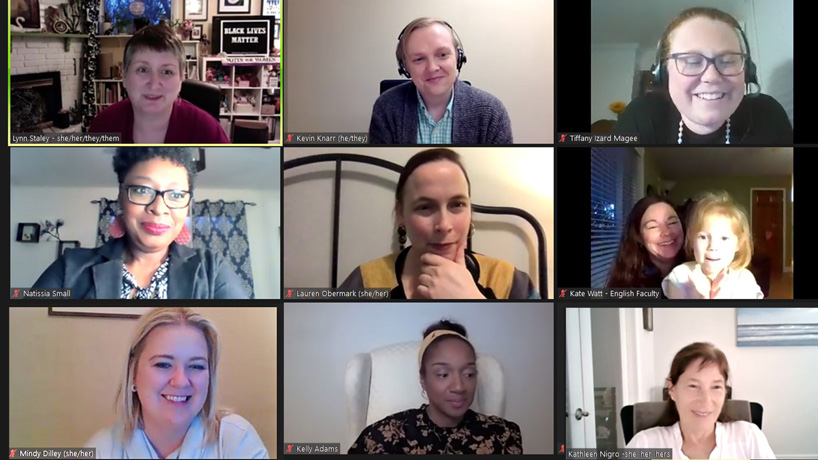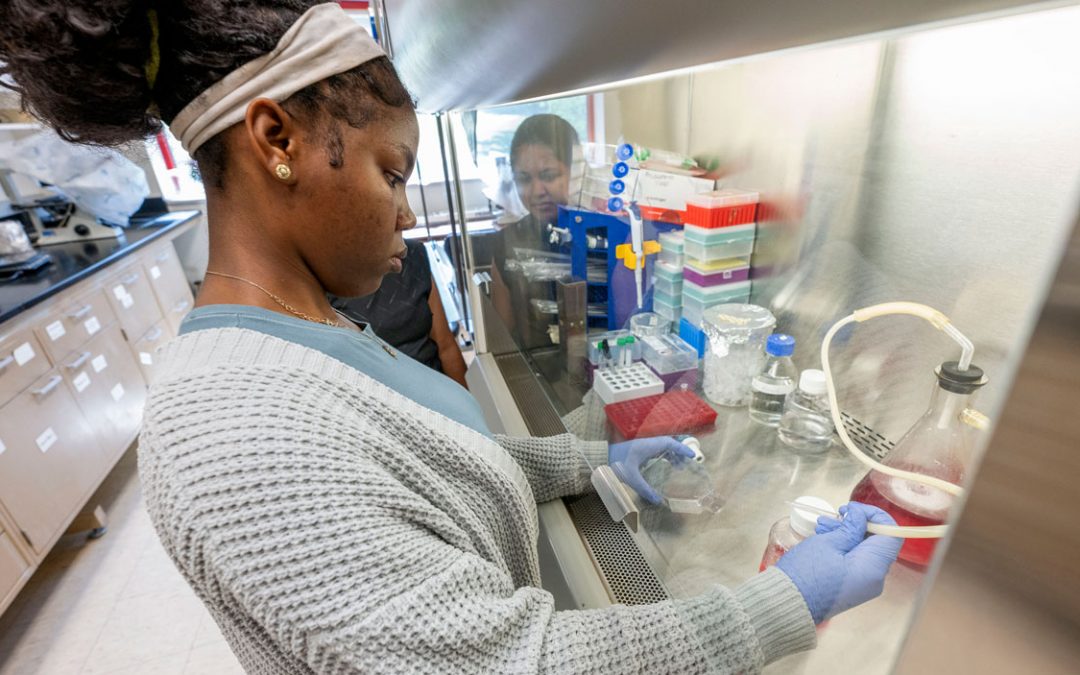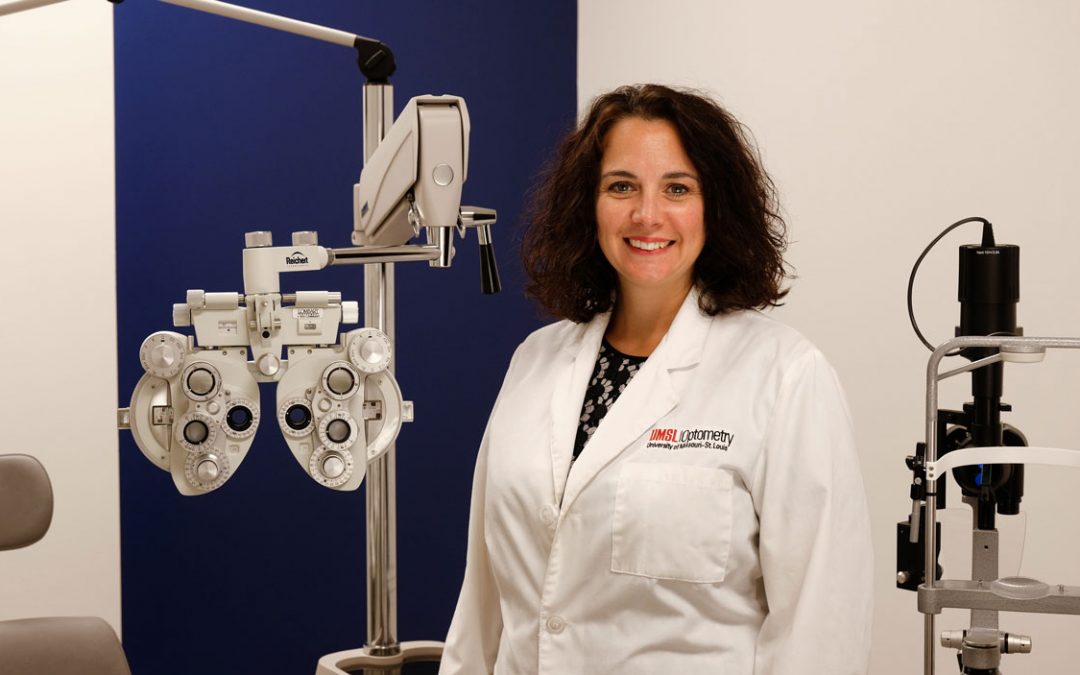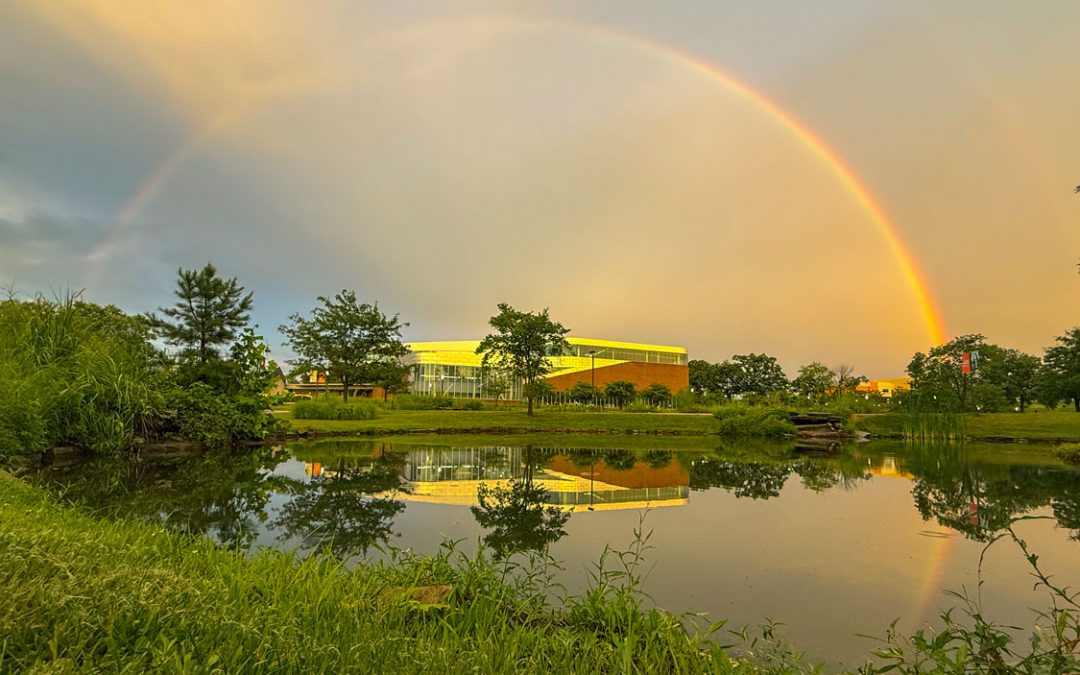
Members of the campus community gather Monday for a virtual event titled “Overture: An Evening of Women’s Storytelling: Stories of Service, Survival, and Strength in the Time of COVID” to kick off Women’s History Month. (Screenshot)
As her 3-year-old daughter Makena sat on her lap, University of Missouri–St. Louis Assistant Teaching Professor of English Kate Watt spoke candidly into her computer camera about the difficulties of balancing work and home life.
“After I take my hat off from this meeting, I’m going to turn to teaching some preschool, and we already fit kindergarten in this morning and then I did a little bit of college teaching this afternoon,” said Watt. “There’s no end to the work week and the work-life balance. I am struggling tremendously with that.”
Watt was speaking during a zoom discussion last Monday to kickoff Women’s History Month at UMSL. The evening event titled “Overture: An Evening of Women’s Storytelling: Stories of Service, Survival, and Strength in the Time of COVID” was described by organizers as a way to celebrate “the voices of women working to heal our sick, teach our children, strengthen our communities and bravely guide us into a new future.”
Moderator Lynn Staley, an associate teaching professor of English and assistant director of the Gender Studies Program, said the online session was an opportunity to listen to each other, find common ground and be heard. Much of the discussion centered around the additional burden placed on women amid the COVID-19 pandemic.
“I think talking about all the things we have in common, the things that we’re worrying about, the ways that we’re searching for those little moments of grace while we are trying to do so much for so many people,” Staley said. “Just knowing that we are all in this together and that we appreciate the fact that this is difficult.”
Associate professor of English Lauren Obermark said the pandemic intensified the challenges of wearing multiple “hats” as a working mother of three children.
“The hats aren’t new,” she said, “But they all seem to weigh a lot more during COVID.”
Gender studies graduate assistant Kevin Knarr gave a presentation highlighting the outsized impact the pandemic has had on women of color.
“Women of color are both more likely to be unemployed and, if employed, more likely to be essential workers,” Knarr said. “This exposes them to greater health risks and further strain for child care and social support.”
Overall nearly half of all working women worked in low-wage positions prior to the pandemic, he said. But the pandemic worsened economic conditions for working women. Many women in essential worker roles were left without child care as schools closed while women who worked at home also became responsible for educating their children.
According to Knarr’s presentation, one in four working women has a child under the age of 14 at home, and full-time working mothers spend an average of 50% more time caring for children compared to full-time working fathers.
Tiffany Izard, student success & retention coordinator, shared that in addition to being a new wife and a mother, she’s faced new feelings of social isolation.
“I feel like I had really learned great coping skills prior to the pandemic of dealing with some of those things,” Izard said. “But afterwards, some of those are gone. Like spending time with people is one of my biggest joys in life – the people that love and that truly know me – so not being able to have that.”
The topic of the gathering of mostly women was often about supporting each other. As a wife and mother of five, Assistant Provost for Access and Academic Support Natissia Small reminded participants that it’s OK to take it easy on themselves.
“I have found that during this entire process it’s been really important to give myself grace,” she said. “It wasn’t that easy in the beginning, because I like my checkmarks on my to-do list to line up perfectly and be done. But that just isn’t the reality of the world that we’re living in.”
Kelly Adams, leader of staff recruiting, selection and onboarding, said her support system, including her husband, has helped her through those “exciting and exhausting” days of working from home and caring for her five children, ages 3,4,5,10 and 12.
But she said women should give themselves some credit too.
“I’ve been calling it magic, I’ve been serving magic all year,” she said with a laugh. “You know with just being intentional about that and celebrating myself. Even when things get challenging, I try to lean back on those times where I say to myself, ‘You were really serving some magic.’”
UMSL will be celebrating Women’s History Month through the month of March with events organized by campus organizations such as the Women’s Leadership Institute, Gender Studies Program, the Panhellenic Association and UMSL Athletics. The campus community will have a chance to meet new College of Business Administration Dean Joan Phillips during a March 16 web presentation titled “All it takes is coffee…and a little bit of courage: A conversation with Joan Phillips, UMSL’s newly appointed and first woman Dean of the College of Business Administration.”
For a schedule of Women’s History Month events see below:
March 8: Body Positivity
March 9: Amp It Up: Turning Up Women’s Leadership is Good for Business
March 13: Women’s Leadership Institute
March 15-25: Penny Wars to benefit Haven of Grace
March 16: A Conversation with Joan Phillips, UMSL’s first woman Dean of the College of Business Administration
Marc 17: Lives on the Edge: Colonial St. Louis Women virtual tour from the Missouri Historical Society
March 22: Chalking with the Honors College
March 24: Women’s Trailblazers Awards
All Month: Hygiene and menstrual product drive














